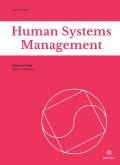Authors: Yick, Liang Thow
Article Type:
Research Article
Abstract:
Human organizations with human beings as interacting agents are complex adaptive systems. Such organizations continuously consume information, make decisions, and evolve with the changing environment. In this respect, all human organizations including businesses must enhance their collective intelligence in order to learn faster and compete more effectively. Thus, adopting an intelligent structure is vital to all businesses as the world moves deeper into the knowledge economy. The paradigmatic shift in thinking, structure, management and operation requires all intelligent human organizations to be designed around intelligence. An intelligent structure encompasses an orgmind, an intangible deep component, as well as a
…physical component. At the physical structure perspective, being able to identify, design and develop an artificial information systems network that synchronizes well with the orgmind is critical. The connectivity of the organization, and the manner in which it behaves, communicates and collaborates, depend on the effectiveness of its information systems network and its orgmind. The orgmind which is at least the collection of all the interacting human thinking systems must be fully aware of both the internal and external environments. Inevitably, in the new economy, intelligent human organizations must be equipped with a well-integrated intelligent information network which functions similarly to the nervous system in biological beings. This study examines the current status of artificial information systems and their networks in businesses with respect to the above concepts.
Show more
Keywords: Intelligence, collective intelligence, autopoiesis, self-organization, knowledge economy, intelligent information systems network, complex adaptive systems, genetic algorithm systems, biodiversity systems
DOI: 10.3233/HSM-2003-22303
Citation: Human Systems Management,
vol. 22, no. 3, pp. 115-124, 2003
Price: EUR 27.50





